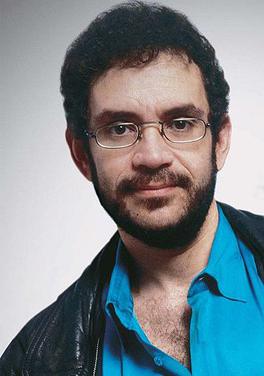Renato Russo facts for kids
Quick facts for kids
Renato Russo
|
|
|---|---|
 |
|
| Background information | |
| Birth name | Renato Manfredini, Jr. |
| Born | March 27, 1960 Rio de Janeiro, RJ, Brazil |
| Origin | Brasília, DF, Brazil |
| Died | October 11, 1996 (aged 36) Rio de Janeiro, RJ, Brazil |
| Genres | Rock |
| Occupation(s) | Singer-songwriter, lyricist, musician |
| Instruments | Vocals, bass guitar, guitar, keyboards |
| Years active | 1978–1996 |
| Labels | EMI |
| Associated acts | Legião Urbana, Aborto Elétrico |
Renato Russo (born Renato Manfredini, Jr., March 27, 1960 – October 11, 1996) was a famous Brazilian rock musician. He was best known as the lead singer of the popular Brazilian pop rock band Legião Urbana. In 2013, a Brazilian film called Somos Tão Jovens (meaning We Are So Young) was made about his life and music career.
Contents
Early Life
Renato Manfredini Jr. was born in Rio de Janeiro, Brazil. He started school at a young age. When he was seven, his family moved to New York in the United States because his father, who worked at Banco do Brasil, got a job there. Later, Renato and his family moved back to Rio de Janeiro.
Growing Up in Brasília
In 1973, when Renato was 13, his family moved from Rio de Janeiro to Brasília, the capital of Brazil. In 1975, at age 15, Renato faced a difficult time. He was diagnosed with a bone disease and needed surgery. While recovering, he spent a lot of time listening to music. He collected many different albums. Renato later said that this period was very important for developing his musical ear.
Musical Journey
Renato Russo started his music career in 1978. He played bass guitar in a punk rock band called Aborto Elétrico. The band lasted about four years but broke up because of disagreements. Even though the band was short-lived, Renato wrote many songs during this time. These songs later became big hits for other bands, including Capital Inicial and Legião Urbana.
After Aborto Elétrico ended, Renato tried a solo career for a few months. He called himself "Trovador Solitário," which means "Lonely Minstrel."
Forming Legião Urbana
In 1982, Renato joined with Marcelo Bonfá (drummer), Eduardo Paraná (guitarist), and Paulo Guimarães (keyboard player). Together, they formed the band Legião Urbana. Renato was the lead singer and also played bass. The band was inspired by post-punk bands like The Cure and The Smiths.
After their first few concerts, Eduardo Paraná and Paulo Guimarães left the band. Dado Villa-Lobos then joined as the guitarist. This created the classic lineup of Legião Urbana. Renato Rocha also played bass for the band from 1984 to 1989.
Legião Urbana's Success
As the leader of Legião Urbana, Renato Russo became a very important musician. He was known as one of the most significant songwriters in Brazilian rock. Fans greatly admired his work.
Renato was known for writing long songs. For example, "Faroeste Caboclo" is over nine minutes long. "Clarisse" is more than ten minutes, and "Metal Contra as Nuvens" is nearly twelve minutes. He also wrote the song "Fátima" in just ten minutes! In the 1990s, he released two solo albums with songs in English and Italian.
Books and Legacy
During his life, Renato Russo had four books published. After he passed away, four more books were released about him. One of these, "Conversações com Renato Russo" (Conversations with Renato Russo), includes parts of interviews where he shared his thoughts on rock music and the world.
Passing Away
Renato Russo passed away on October 11, 1996, after a serious illness. He left behind his son, Giuliano Manfredini, who was seven years old at the time.
Eleven days after Renato's death, the remaining members of Legião Urbana, Dado and Bonfá, announced the end of the band. During Renato's life, Legião Urbana sold about 25 million albums in Brazil. Even many years after his death, his albums continue to sell well.
Discography
With Legião Urbana
Solo Albums
Studio albums
- The Stonewall Celebration Concert (1994)
- Equilíbrio Distante (1995)
- O Último Solo (1997)
- Presente (2003)
Compilation albums
- Série Bis: Renato Russo - Duplo (2000)
- Série Para Sempre: Renato Russo (2001)
- Série Identidade: Renato Russo (2002)
- O Talento de Renato Russo (2004)
- Renato Russo - Uma Celebração (2006)
- O Trovador Solitário (2008)
- Renato Russo: Duetos (2010)
- Sinfônico (2013)
- Somos Tão Jovens (movie soundtrack, 2013)
See also
 In Spanish: Renato Russo para niños
In Spanish: Renato Russo para niños
 | Kyle Baker |
 | Joseph Yoakum |
 | Laura Wheeler Waring |
 | Henry Ossawa Tanner |

